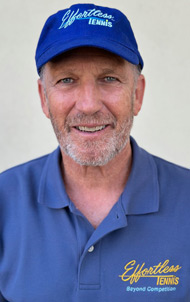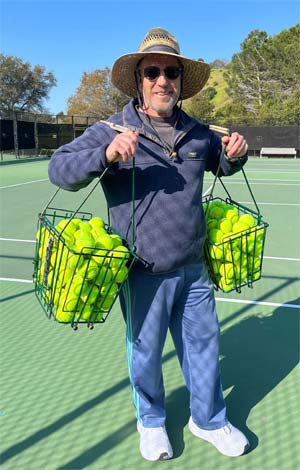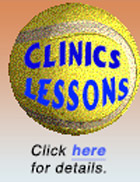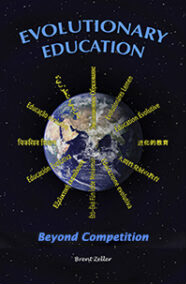
A Physically & Psychologically Healthier Way to Live, Learn, & Play
Beyond Competition
A Physically & Psychologically Healthier Way to Live, Learn, & Play
Beyond Competition
 Hello I’m Brent Zeller, founder and developer of Effortless Tennis.
Hello I’m Brent Zeller, founder and developer of Effortless Tennis.
Effortless Tennis is a completely different approach to tennis instruction, learning, and life. The difference is in the underlying philosophy. Conventional tennis is based on a competitive model of behavior, i.e. trying to beat the other player. Effortless Tennis is based on a cooperative, i.e. non-competitive behavior model, working with the other player so that each will benefit and attain their potential. This philosophy applies not just to tennis but is an overall worldview. In much of life, competition is out of control. Everybody is competing against everybody else. The old “dog eat dog” mentality has gone too far. It is time to raise our consciousness and learn how to help each other be our best. This belief is the core of Effortless Tennis.
“If competition were a drug, the FDA would ban it for having too many negative side-effects.”
Comprehensive Learning System
Effortless Tennis is a comprehensive, integrated system of learning designed to help players not only reach their physical potential, but their mental and emotional potentials as well. The physical aspects of the game are very important, but it is the mental and emotional components that are the true challenge and determine how much you will improve. The Effortless Learning System works well for players of all levels – neophyte to world class. The program has been developed from my over sixty year involvement in sports, fifty-six years of playing tennis, fifty years of teaching tennis, and fifty plus years of studying history, psychology, philosophy, human nature, and learning theory.
Effortless
What I have observed while watching or playing sports was that there was this “state of being” that sometimes occurred where everything seemed to flow and nothing could go wrong. This is what I have termed the “effortless” state. It is commonly referred to as ” the zone.” At first, attaining the zone is a fleeting experience. As soon as you realize it is happening, it is gone. In time, you are able to regulate its occurance, but it takes quite a bit of time and practice. This phenomenon so fascinated me that I have spent the last fifty years researching, experimenting, and understanding just what was happening. From this work I have isolated the variables and come up with a model for motor learning that enables everyone to experience this elusive state.
Putting The Cart Before The Horse
One of the main obstacles to attaining this “effortless state” is conventional tennis’ premature emphasis on competition and winning. The problem comes from the introduction of competition before a player has actually learned the physical, mental, and emotional fundamentals of the game. In conventional tennis the goal, from day one, is to learn how to beat somebody. People either take a few lessons or maybe no lessons and then immediately start playing games (competitively.) It is virtually impossible to learn how to play the game and compete at the same time. Mastering the fundamentals is essential before beginning competition. Otherwise, long-term development is greatly inhibited. As you can see in the graph below, in conventional tennis there is almost no time before you begin competing. Once you begin competing you do it for the rest of the time you play the game.

 SIGN UP TODAY!
SIGN UP TODAY!
 See Brent’s book
Evolutionary Education
See Brent’s book
Evolutionary Education
ARTICLES
* * NEW * *
Kentfield & Ross Living 11/24 Evolving to Higher Levels of Consciousness More ►
Pacific Sun 6/25/24 A GAME OF ZERO LOVE More ►
The Virginia Gazette 5/18/24 STROKES OF GENIUS More ►
Marin IJ 4/27/24 ‘EFFORTLESS’ ETHOS More ►
Physical & Psychological Behavior Therapy More ►
“Your Serve: Master Before The Match” More ►
“The Kids Aren’t All Right” Pacific Sun More ►
“A 20 Year Adventure in Non-Competitive Learning” More >
“The System’s Not Just Broken—It’s Fatally Flawed” More ►
“Learning & Competition” A few questions for teachers, coaches & parents on the role of competition in learning. More ►
